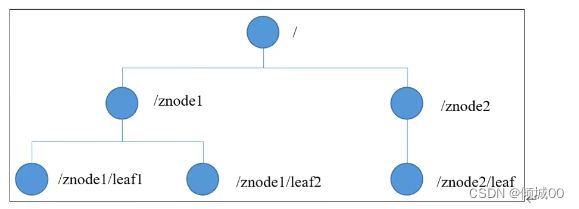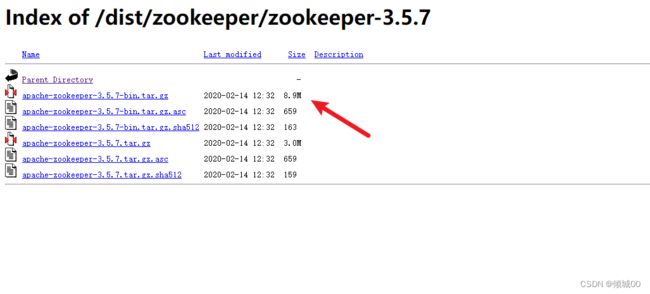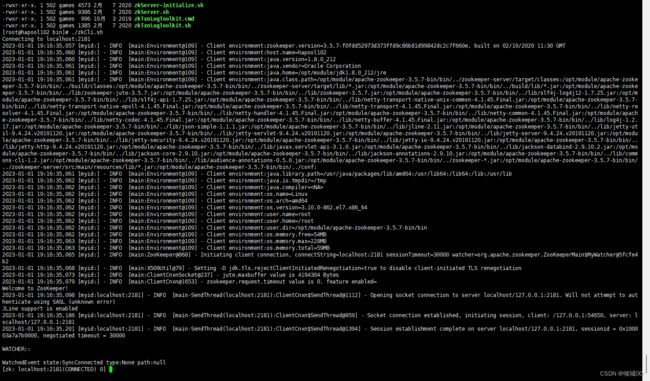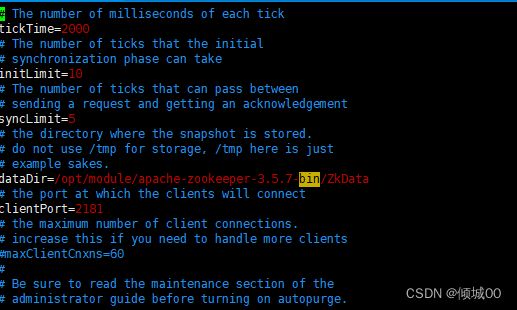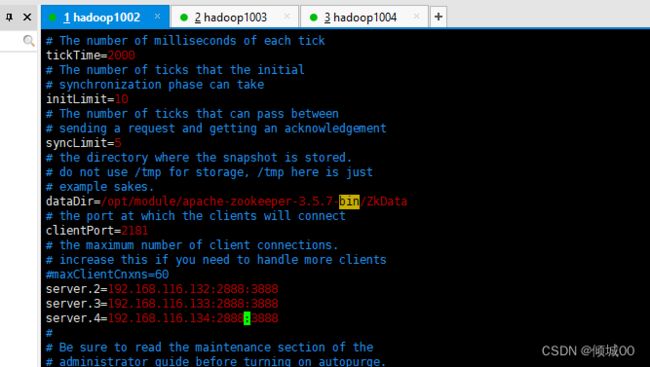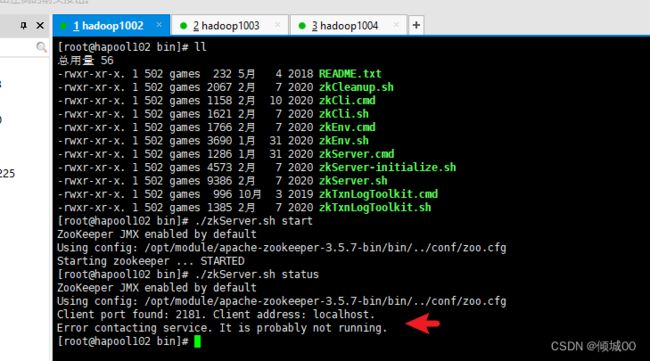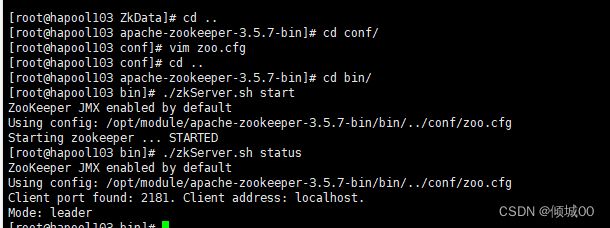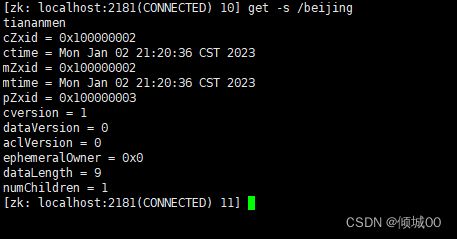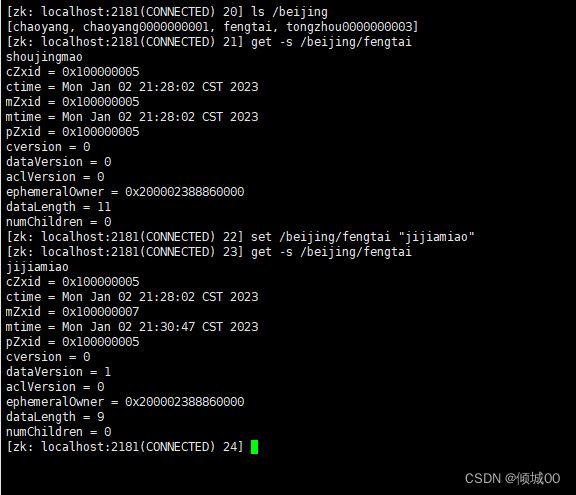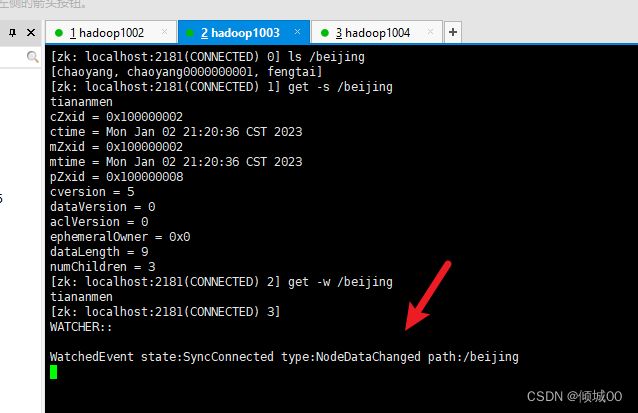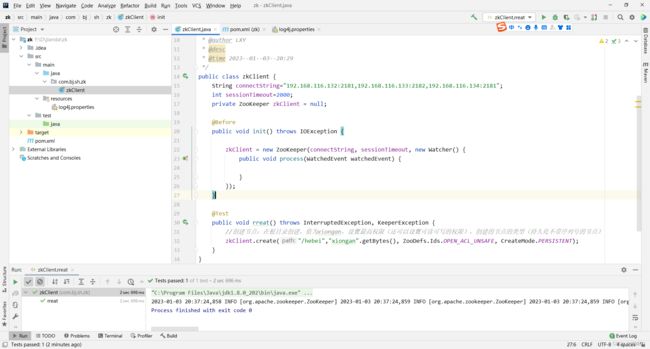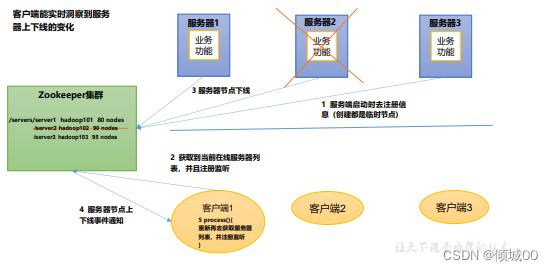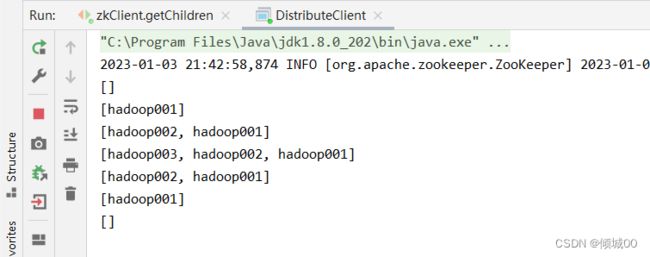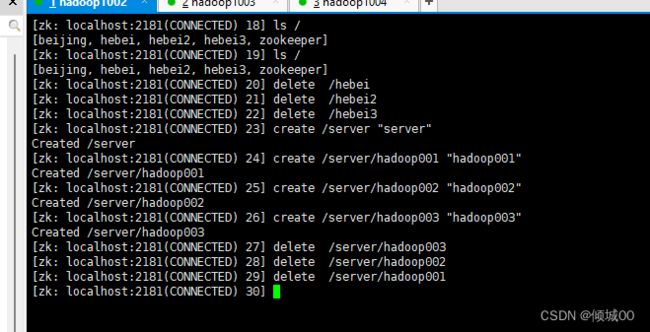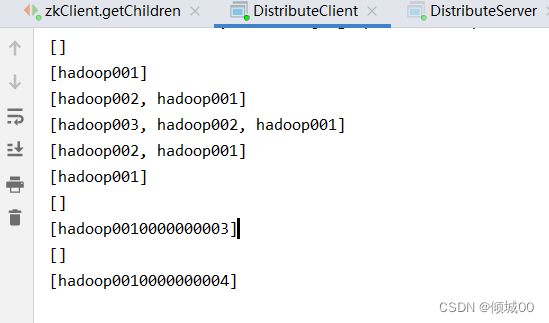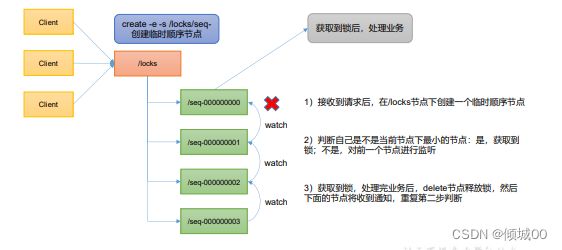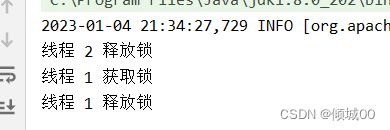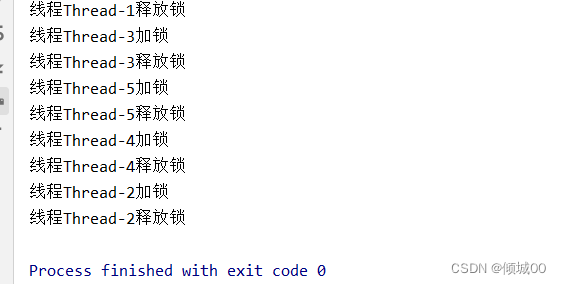zookeeper
zookeeper
- zookeeper
-
- 1.2 zk的特点
- 1.3 zk的数据结构
- 1.4 zk的应用场景
- 1.5 zk的下载
- 1.6 搭建zk
- 1.7 zk的配置文件解读
- 1.8 zk集群的搭建
- 1.9 第一次启动的选举机制
- 1.10 非第一次选举机制
- 1.11 ZNode节点信息
- 1.12 节点的类型
- 1.13 节点的监控
- 1.14 JAVA代码操作zk
- 1.15 节点的监听
- 1.16 判断节点是否存在
- 1.17 客户端写数据
- 1.15 服务器动态上下线
- 1.18 服务器的动态上下线实现
- 1.19 ZooKeeper 分布式锁
- 1.20 Curator 框架实现分布式锁案例
zookeeper
- zookeeper从设计的模式来说,他是一个基于观察者模式的分布式服务管理框架,
它负责存储和管理大家关心的数据,然后接受观察者的注册,一旦这些数据发生了变化,zookeeper就将负责通知已在zookeeper上观察的观察者做出相对的反应
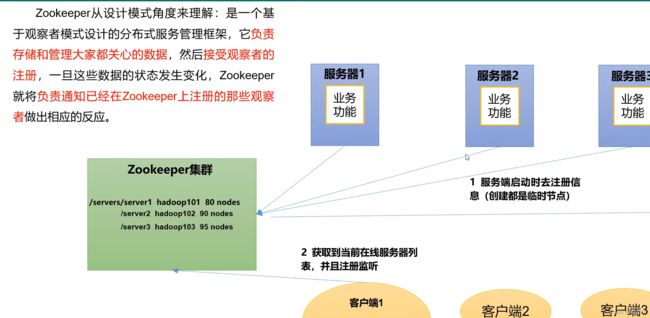
1.2 zk的特点
- 1) zk有一个领导者(Leader),多个跟随者(Follewer)组成的集群
- 2)集群中只要有
半数以上的节点存活,zk就能正常服务,所以zk适合安装安装奇数服务器 - 3) 全局数据一致性,每个Server保存一份相同的数据副本,Client无论连接哪一个Server,数据都是一致的
- 4)更新读写顺序执行,来自同一个Client的请求安其发送的顺序会依次执行
- 5)数据更新的原子性,一次数据更新要么全部成功,要吗全部失败
- 6)实时性,在一定的时间范围内,Client能读到最新的数据
1.3 zk的数据结构
1.4 zk的应用场景
提供的服务包括统一的命名服务,统一的配置管理,统一的集群管理,服务器节点动态上下线,软负载均衡等
- 统一命名
在分布式的环境下需要经常对应用/服务进行统一命名便于识别
例如:IP不容易记住,但是域名能记住

- 统一的配置管理
1)在分布式的环境下,配置的同步非常的常见,
一般要求一个集群中,所有的配置是一样的,比如kafka集群
对配置文件修改之后希望尽快的同步到各个节点上
2)配置管理可由zk实现,
可以将配置信息写入到zk的一个znode中
各个客户端监听这个znode
一旦这个znode中的数据修改,zk将通知各个客户端的服务器
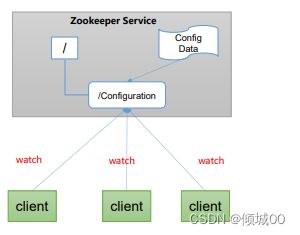
- 统一的集群管理
- 1) 分布式环境中,掌握每个节点的状态是必要的,
- 可以根据节点实施状态做出一点调整
- 2)zk可以实现监控节点的变化,
- 可以将节点信息写入到zk的一个Zznde
- 监听这个znode并获取他的实时状态变化
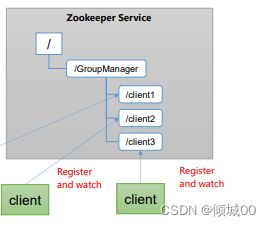
- 服务器的上下线
- 客户端可以实施的监控服务的上下线的变化
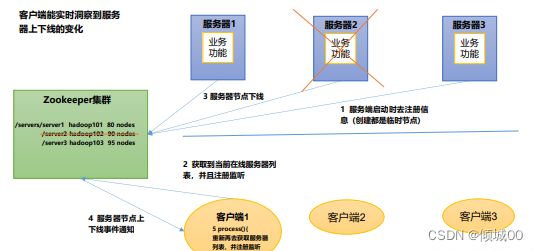
- 负载均衡
- 在zk中记录每个服务器的访问次数,让访问最终少的服务器去处理最新的客户端请求

1.5 zk的下载
1.6 搭建zk
- 首先安装java环境
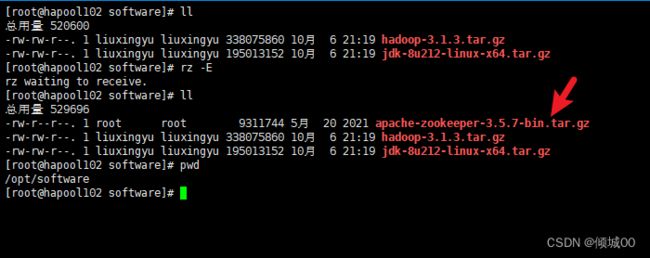
tar -zxvf apache-zookeeper-3.5.7-bin.tar.gz -C /opt/module/ - 解压到module目录 - 进入之后创建一个ZkData文件,用来存储数据
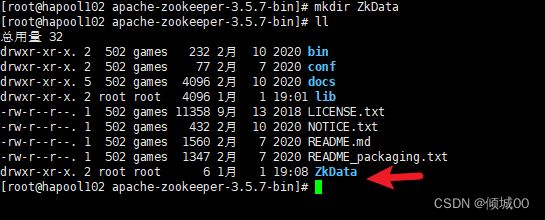
- 在conf 文件下修改 vim zoo_sample.cfg 文件
- 修改存储位置,默认是存在临时文件中的,现在手动修改指向刚才创建的目录
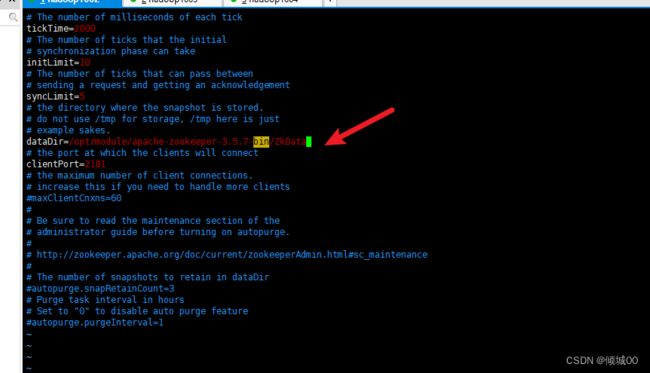
- 修改配置文件的名字 mv zoo_sample.cfg zoo.cfg
- 在bin目录中,上面这个是启动客户端,下面这个是启动服务端
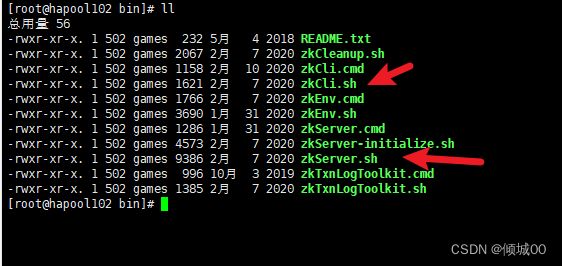
- 启动客户端
- 在bin目录
- ./zkServer.sh start
- 查看状态
./zkServer.sh status
- 启动客户端
./zkCli.sh
输入 quit 即可退出
- 关闭zk
./zkServer.sh stop
1.7 zk的配置文件解读
-
Zookeeper中的配置文件zoo.cfg中参数含义解读如下:
-
Leader和Follower初始连接时能容忍的最多心跳数(tickTime的数量)
-
3)syncLimit:5 同步通讯时限

Leader和Follower之间通信时间如果超过syncLimit * tickTime,Leader认为Follwer死
掉,从服务器列表中删除Follwer。 -
4)dataDir:保存Zookeeper中的数据
注意:默认的tmp目录,容易被Linux系统定期删除,所以一般不用默认的tmp目录。 -
5)clientPort = 2181:客户端连接端口,通常不做修改。
1.8 zk集群的搭建
-
配置服务器编号
首先去/opt/module/apache-zookeeper-3.5.7-bin/ZkData
的目录下创建一个名为myid的文件,以我是102,103,104这三台集群搭建
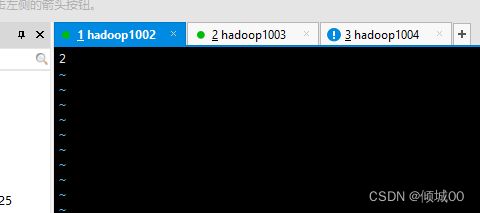
-
这个的作用是一个唯一的标识,可以理解为身份证,标识自己是那一台服务器
-
配置zoo.cfg文件
server.2=192.168.116.132:2888:3888
server.3=192.168.116.133:2888:3888
server.4=192.168.116.134:2888:3888
- 配置参数:
- server.A=B:C:D。
- A是一个数字,标识是哪一台(我们刚刚在myid中配置的)
集群模式下配置一个文件 myid,这个文件在 dataDir 目录下,这个文件里面有一个数据
就是 A 的值,Zookeeper 启动时读取此文件,拿到里面的数据与 zoo.cfg 里面的配置信息比 较从而判断到底是哪个 server。 - B是这个服务器的地址
- C是这个服务器中Follower与Leader服务器交信息的端口
- D是万一集群中Leader挂了,需要一个端口号来进行重新选举,选举成一个新的Leader,这个端口是用来这两个互相通信的端口
- 分发配置文件
- 启动项目,先启动102
在Bin目录中执行
./zkServer.sh start
执行查看
./zkServer.sh status
- 发现报错了因为我们在配置文件中配置了3台的集群,zk是集群超过半数才会启动,所以需要启动>1.5个机器才会成功运行起来
- 启动103上的机器
- 发现103的角色是leader

- 重新执行102发现102的角色是follower
- 启动104 ,发现104的角色是follower

- PS:集群能否正常启动看的是配置文件中配置了几台集群,超过过半才会成功启动
- 配置文件的集群ID是我们在myid文件中配置的唯一ID
1.9 第一次启动的选举机制
- 服务器1启动,发起一次选举,服务器自己投自己一票,此时服务器1票数一致,无法选举成功,服务器1的状态就变为LOOKING
- 服务器2启动,在发起一次选举,服务器一和服务器二会自己投自己,然后
交换选举信息此时服务器一发现服务器2的myid比自己目前投票推荐的(服务器一)y要大,更改投票选举为服务器2此时服务器1位0票,服务器2为2票,没有达到半数以上,故而无法成功选举,此时服务器的状态为LOOKING - 服务器3启动,发起一次选举,此时服务器2发现自己支持的(服务器2)的myid没有服务器3大,然后会选举到服务器3上,服务器3是3票,超过了半数,服务器3当选leader,服务器1和2当选follower
- 服务器4启动,此时服务器1-2-3的状态不是looking不会更改选票信息,此时服务器4服从多数,故而变成follwer,
- 服务器5启动,和服务器4一样
- 补充:每次客户端写操作会有的事务id(zxid),
- 1)SID:是服务器ID,他和服务器的myid是一样的
- 2)ZXID:是事务的id,
用来表示一次服务器状态的变更,在某一时刻,集群中的每台机器的ZXID是不同的,这个ZK的服务端更新请求有关系 - 3)EPOCH:他是每一个服务器任期的编号,没有leader时,同一轮投票值是相同的,没投完一票就会增加
1.10 非第一次选举机制
- 1) 当zk服务器中发生以下两种情况的时候会发生选举:
- 服务器初始化(刚启动的时候)
- 服务运行期间无法和leader联系
- 2)而当一台机器进入Leader选举流程时,当前集群也可能会处于以下两种状态:
- 集群的leader还在
-
- 那么对于第一种已经存在learder的状态,机器会自动的选举learder,但会被告知learder还存在,对于该机器来说急需要重新连接learder即可
- 集群的learder确实不存在
- 假设zk5服务器挂了,并且learder挂了,那么机器就只剩下1,2,4这三台机器了,这三台机器满足半数,就会重新选举
- 按照(EPOCH(任期id),ZXID(事务ID),SID(唯一的ID))

- 选举的机制先按照EPOCH进行比较,大者则直接胜出
- 其次按照ZXID事务的ID进行判断,大者胜出
- 最后按照SID判断,大者胜出,也就是唯一的ID(myID)
1.11 ZNode节点信息
- 启动客户端 ./zkCli.sh
- 输入 ls -s / 查看基本的信息
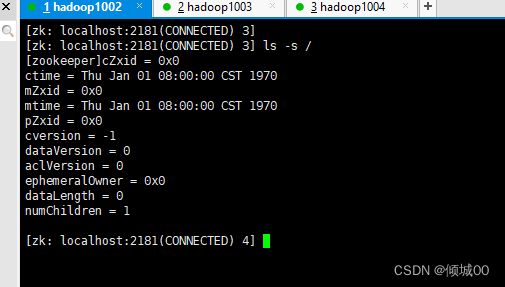
- czxid:
创建节点的事务id,每次修改zk状态都会产生一个zk的事务id,事务id是zk中所有事务修改的总的次数,每次修改都会有一个唯一的ZXID,如果zxid1小于zxid2,那么zxid1是在zxid2之前发生的 - ctime: Znode被创建的毫秒数,从1970年开始的
- mzxid:znode最后更新的事务zxid
- mtime:znode最后被修改的毫秒数,从1970年开始的
- pZxid:znode最后更新子节点的zxid
- cversion:znode子节点的变化,znode子节点的修改次数
- dataversion:znode的数据变化号
- aclVersion:访问控制列表的变化号
- ephemeraOwner:如果是临时节点,这个Znode的拥有者的session id,如果不是临时节点则是0
- dataLength:znode的数据长度
- numChildren:znode的子节点数量
1.12 节点的类型
持久节点和不持久节点,不持久的节点断开连接之后会自动删除
持久节点和不持久节点下面还分持久节点和顺序编号和物顺序编号,非持久节点的顺序编号和无顺序编号
- 1.创建持久无不编号的节点
创建了一个北京节点,他的值是天安门
create /beijing "tiananmen"
-
- 创建持久的目录节点
创建了一个北京节点下的朝阳节点,他的值是双合
create /beijing/chaoyang "shuangjing"
-
- 获取值
- 就可以拿到北京下的值是天安门,还能把基本的信息获得到
get -s /beijing
- 4.创建持久化带编号的节点
- 之前已经创建好了一个朝阳他的值是双井,如果节点重复了会报错
- 用带编号的创建节点,创建出来的节点是带编号的,向上走的,不会重复
create -s /beijing/chaoyang "tianlemen"
- 创建一个北京下丰台,值是首经贸
create -e /beijing/fengtai "shoujingmao"

6. 创建临时节点带序号 create -e -s /beijing/tongzhou “dd”

7.修改值
- 之前丰台的值是首经贸,修改为纪家庙
set /beijing/fengtai "jijiamiao"
1.13 节点的监控
- 首先要有一个main线程
- 在main线程中创建zk的客户端,这时就会创建两个线程,一个负责网络通信(connet),一个负责监听(listener)
- 通过connet线程将注册的监听事件发送给zk,
- 在zk的注册器监听列表中,将注册的监听事件添加到列表中
- zk监听到数据发生了变化,就会将这个消息发送给listener线程
- listener线程就会调用process回调方法
- 常见的监听
- get path [watch] 监听节点数据的变化
- ls path [watch]监听子节点的增减变化

- 对节点的内容监控
- 1.3 服务器通过 get -w /beijing 去监控北京的内容是否发生变化
-
102 去修改数据,103会成功的监听到,但是这个监听只能监听一次,如果还想继续监听就得重新注册
-
监听节点的增减变化
1.14 JAVA代码操作zk
- pom
4.0.0
com.bj.sh.zk
zk
1.0-SNAPSHOT
junit
junit
RELEASE
org.apache.logging.log4j
log4j-core
2.8.2
org.apache.zookeeper
zookeeper
3.5.7
- 在resources下创建log4j.properties
log4j.rootLogger=INFO, stdout
log4j.appender.stdout=org.apache.log4j.ConsoleAppender
log4j.appender.stdout.layout=org.apache.log4j.PatternLayout
log4j.appender.stdout.layout.ConversionPattern=%d %p [%c]
- %m%n
log4j.appender.logfile=org.apache.log4j.FileAppender
log4j.appender.logfile.File=target/spring.log
log4j.appender.logfile.layout=org.apache.log4j.PatternLayout
log4j.appender.logfile.layout.ConversionPattern=%d %p [%c]- %m%n
- zkClient
package com.bj.sh.zk;
import org.apache.zookeeper.*;
import org.junit.Before;
import org.junit.Test;
import java.io.IOException;
/**
* @author LXY
* @desc
* @time 2023--01--03--20:29
*/
public class zkClient {
String connectString="192.168.116.132:2181,192.168.116.133:2182,192.168.116.134:2181";
int sessionTimeout=2000;
private ZooKeeper zkClient = null;
@Before
public void init() throws IOException {
zkClient = new ZooKeeper(connectString, sessionTimeout, new Watcher() {
public void process(WatchedEvent watchedEvent) {
}
});
}
@Test
public void rreat() throws InterruptedException, KeeperException {
//创建节点:在根目录创建,值为xiongan,设置最高权限(还可以设置可读可写的权限),创建的节点的类型(持久化不带序列号的节点)
zkClient.create("/hebei","xiongan".getBytes(), ZooDefs.Ids.OPEN_ACL_UNSAFE, CreateMode.PERSISTENT);
}
}
![]()
1.15 节点的监听
@Test
public void getChildren() throws Exception {
List children = zkClient.getChildren("/", true);
for (String child : children) {
System.out.println(child);
}
// 延时阻塞
Thread.sleep(Long.MAX_VALUE);
}
@Before
public void init() throws IOException {
zkClient = new ZooKeeper(connectString, sessionTimeout, new Watcher() {
public void process(WatchedEvent watchedEvent) {
try {
System.out.println("----------------------------");
final List children = zkClient.getChildren("/", true);
for (String child : children) {
System.out.println(child);
}
// Thread.sleep(Long.MAX_VALUE);
System.out.println("-------------");
} catch (KeeperException e) {
e.printStackTrace();
} catch (InterruptedException e) {
e.printStackTrace();
}
}
});
}
- 在getChildren中执行监听,监听到的数据只会执行一次,设置的是true,就会执行上面我们实例化的那一个监听方法,
- Thread.sleep(Long.MAX_VALUE); 最大睡眠是保证线程不会死亡可以一直监听
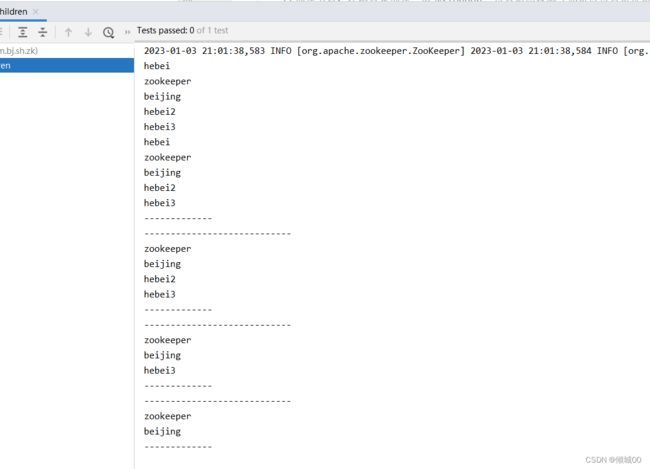
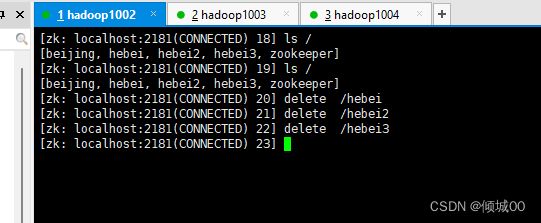
- 执行删除,成功的监听到了数据
1.16 判断节点是否存在
@Test
public void exist() throws InterruptedException, KeeperException {
final Stat exists = zkClient.exists("/hebei", false);
System.out.println(exists);
}
1.17 客户端写数据
- 如果客户端的请求是leader
- 1)首先leader会自己写一份
- 2)然后leader会向其他的一个follower写一份
- 3)follower写数据完毕之后会想leader进行一个应答
- 4)如果写入的机器超过了半数,直接向客户端应答
- 5)然后写最后剩下的follower,写完了follower向leader进行应答

- 如果客户端请求的是follower
- 1)首先follower会向leader发送写请求(因为followe没有写操作只能读)
- 2)leader首先自己先写一份,然后发送给follower写请求,
- 3)follower写完了会向leader发送ack
- 4)超过半数之后,leader会向follower发送存储数据已经超过了一半,需要向客户端发送ack(因为客户端请求的是follower,leader不能直接返回)
- 5)leader在讲剩下的follower写入数据,返回ack

1.15 服务器动态上下线
- 首先服务器启动的时候会在server下创建路径文件
- 客户端去集群中监听列表
- 服务器下线
- 客户端会受到下线同时,然后去回调消息
1.18 服务器的动态上下线实现
- DistributeClient
- 作用是监听server下的数据,如果客户端上线就会创建一个临时的节点,如果下线就会自动删除一个临时的接地那,DistributeClient的作用是客户端监控,动态的获取服务器的上下线信息
package com.bj.sh.zk;
import org.apache.zookeeper.KeeperException;
import org.apache.zookeeper.WatchedEvent;
import org.apache.zookeeper.Watcher;
import org.apache.zookeeper.ZooKeeper;
import java.io.IOException;
import java.util.ArrayList;
import java.util.List;
/**
* @author LXY
* @desc //客户端的监听
* @time 2023--01--03--21:35
*/
public class DistributeClient {
String connectString="192.168.116.132:2181,192.168.116.133:2182,192.168.116.134:2181";
int sessionTimeout=2000000;
ZooKeeper zkClient=null;
public static void main(String[] args) throws IOException, InterruptedException, KeeperException {
DistributeClient client=new DistributeClient();
//连接客户端
client.getconntion();
client.getChildren();
client.sleep();
}
private void sleep() throws InterruptedException {
Thread.sleep(Long.MAX_VALUE);
}
//客户端的监听
private void getChildren() throws InterruptedException, KeeperException {
Liststr=new ArrayList();
List children = zkClient.getChildren("/server", true);
for (String child : children) {
str.add(child);
}
System.out.println(str.toString());
}
//连接客户端
private void getconntion() throws IOException {
zkClient=new ZooKeeper(connectString, sessionTimeout, new Watcher() {
public void process(WatchedEvent watchedEvent) {
try {
getChildren();
} catch (InterruptedException e) {
e.printStackTrace();
} catch (KeeperException e) {
e.printStackTrace();
}
}
});
}
}
-
通过shell模拟了一下,好用
-
DistributeServer
-
他的功能是运行的时候自动创建临时的server/队列,下线自动删除
package com.bj.sh.zk;
import org.apache.zookeeper.*;
import java.io.IOException;
/**
* @author LXY
* @desc
* @time 2023--01--03--21:45
*/
public class DistributeServer {
String connectString="192.168.116.132:2181,192.168.116.133:2182,192.168.116.134:2181";
int sessionTimeout=20000000;
ZooKeeper zkserver=null;
public static void main(String[] args) throws IOException, InterruptedException, KeeperException {
DistributeServer distributeServer=new DistributeServer();
distributeServer.getconntion();
distributeServer.creatserver("hadoop001");
distributeServer.sleep();
}
private void sleep() throws InterruptedException {
Thread.sleep(Long.MAX_VALUE);
}
private void creatserver(String hostname) throws InterruptedException, KeeperException {
zkserver.create("/server/"+hostname,hostname.getBytes(), ZooDefs.Ids.OPEN_ACL_UNSAFE, CreateMode.EPHEMERAL_SEQUENTIAL);
System.out.println("hostname:"+hostname);
}
//连接客户端
private void getconntion() throws IOException {
zkserver=new ZooKeeper(connectString, sessionTimeout, new Watcher() {
public void process(WatchedEvent watchedEvent) {
}
});
}
}
- 效果显著,上线提醒,下线也会提醒
1.19 ZooKeeper 分布式锁
- 一个线程进来的时候出创建临时的节点,判断自己是不是当前节点下最小的节点,如果不是则对前一个进行监听,处理完成业务之后释放锁
- 代码实现(代码有bug,以后在改)
- 上锁工具类
package com.bj.sh.zk.lock;
import com.bj.sh.zk.zkClient;
import org.apache.zookeeper.*;
import org.apache.zookeeper.data.Stat;
import java.io.IOException;
import java.util.Collections;
import java.util.List;
import java.util.concurrent.CountDownLatch;
/**
* @author LXY
* @desc 分布式悲观锁
* @time 2023--01--04--20:31
*/
public class DistributedLock {
String connectString="192.168.116.132:2181,192.168.116.133:2182,192.168.116.134:2181";
int sessionTimeout=2000;
ZooKeeper zk=null;
private String rootNode = "locks";
private String subNode = "seq-";
//实例化计数器
private CountDownLatch connectLatch = new CountDownLatch(1);
//节点等待
private CountDownLatch waitLatch = new CountDownLatch(1);
// 当前 client 等待的子节点
private String waitPath;
// 当前 client 创建的子节点
private String currentNode;
public DistributedLock() throws IOException, InterruptedException, KeeperException {
//连接
zk=new ZooKeeper(connectString, sessionTimeout, new Watcher() {
public void process(WatchedEvent event) {
if (event.getState() == Event.KeeperState.SyncConnected) {
connectLatch.countDown();
}
if (event.getType() == Event.EventType.NodeDeleted && event.getPath().equals(waitPath))
{
waitLatch.countDown();
}
}
});
//连接,等待一个线程连接
connectLatch.await();
Stat exists = zk.exists("/locks", false);
if (exists==null){
System.out.println("根节点不存在,创建临时节点");
zk.create("/locks", "locks".getBytes(), ZooDefs.Ids.OPEN_ACL_UNSAFE, CreateMode.PERSISTENT);
}
}
//加锁
void zkLock() throws InterruptedException, KeeperException {
currentNode = zk.create("/" + rootNode + "/" + subNode,null, ZooDefs.Ids.OPEN_ACL_UNSAFE, CreateMode.EPHEMERAL_SEQUENTIAL);
// wait 一小会, 让结果更清晰一些
Thread.sleep(10);
// 注意, 没有必要监听"/locks"的子节点的变化情况
List childrenNodes = zk.getChildren("/" +rootNode, false);
// 列表中只有一个子节点, 那肯定就是 currentNode , 说明 client 获得锁
if (childrenNodes.size() == 1) {
return;
} else {
//对根节点下的所有临时顺序节点进行从小到大排序
Collections.sort(childrenNodes);
//当前节点名称
String thisNode = currentNode.substring(("/" +rootNode + "/").length());
//获取当前节点的位置
int index = childrenNodes.indexOf(thisNode);
if (index == -1) {
System.out.println("数据异常");
} else if (index == 0) {
// index == 0, 说明 thisNode 在列表中最小, 当前 client 获得锁
return;
} else {
// 获得排名比 currentNode 前 1 位的节点
this.waitPath = "/" + rootNode + "/" +
childrenNodes.get(index - 1);
// 在 waitPath 上注册监听器, 当 waitPath 被删除时, zookeeper 会回调监听器的 process 方法
zk.getData(waitPath, true, new Stat());
//进入等待锁状态
waitLatch.await();
return;
}
}
}
public void zkUnlock() throws InterruptedException, KeeperException {
zk.delete(this.currentNode, -1);
}
}
- 测试
package com.bj.sh.zk.lock;
import org.apache.zookeeper.KeeperException;
import java.io.IOException;
/**
* @author LXY
* @desc
* @time 2023--01--04--20:36
*/
public class test {
public static void main(String[] args) throws IOException, InterruptedException, KeeperException {
// 创建分布式锁 1
final DistributedLock lock1 = new DistributedLock();
// 创建分布式锁 2
final DistributedLock lock2 = new DistributedLock();
new Thread(new Runnable() {
public void run() {
// 获取锁对象
try {
lock1.zkLock();
System.out.println("线程 1 获取锁");
Thread.sleep(5 * 1000);
lock1.zkUnlock();
System.out.println("线程 1 释放锁");
} catch (Exception e) {
e.printStackTrace();
}
}
}).start();
new Thread(new Runnable() {
public void run() {
// 获取锁对象
try {
lock2.zkLock();
System.out.println("线程 2 获取锁");
Thread.sleep(5 * 1000);
lock2.zkUnlock();
System.out.println("线程 2 释放锁");
} catch (Exception e) {
e.printStackTrace();
}
}
}).start();
}
}
1.20 Curator 框架实现分布式锁案例
1)原生的 Java API 开发存在的问题
(1)会话连接是异步的,需要自己去处理。比如使用 CountDownLatch
(2)Watch 需要重复注册,不然就不能生效
(3)开发的复杂性还是比较高的
(4)不支持多节点删除和创建。需要自己去递归
-
curator是一款专门解决分布式锁的框架,
详情请查看官方文档:https://curator.apache.org/index.html -
代码实现
-
pom
org.apache.curator
curator-framework
4.3.0
org.apache.curator
curator-recipes
4.3.0
org.apache.curator
curator-client
4.3.0
- 代码
package com.bj.sh.zk.lock2;
import org.apache.curator.RetryPolicy;
import org.apache.curator.framework.CuratorFramework;
import org.apache.curator.framework.CuratorFrameworkFactory;
import org.apache.curator.framework.recipes.locks.InterProcessMutex;
import org.apache.curator.retry.ExponentialBackoffRetry;
/**
* @author LXY
* @desc
* @time 2023--01--04--21:45
*/
public class test {
public static void main(String[] args) {
final InterProcessMutex lock1 = new InterProcessMutex(getCuratorFramework(), "/lock");
for (int i = 0; i < 5; i++) {
new Thread(new Runnable() {
public void run() {
try {
//加锁
lock1.acquire();
System.out.println("线程" + Thread.currentThread().getName() + "加锁");
Thread.sleep(5000);
lock1.release();
System.out.println("线程" + Thread.currentThread().getName() + "释放锁");
} catch (Exception e) {
e.printStackTrace();
}
}
}).start();
}
}
private static CuratorFramework getCuratorFramework() {
//重试策略,初试时间 3 秒,重试 3 次
ExponentialBackoffRetry policy = new ExponentialBackoffRetry(3000, 3);
// 通过工厂创建
CuratorFramework build = CuratorFrameworkFactory.builder().connectString("192.168.116.132:2181,192.168.116.133:2182,192.168.116.134:2181")
.connectionTimeoutMs(2000)
.sessionTimeoutMs(2000)
.retryPolicy(policy)
.build();
build.start();
return build;
}
}

